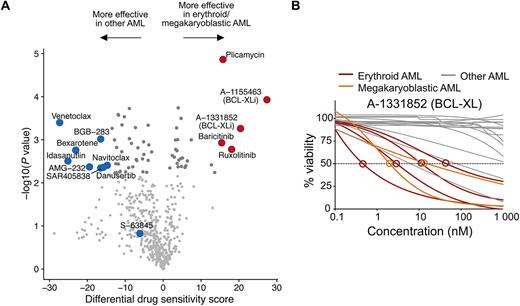Abstract
Myeloid neoplasms with erythroid or megakaryocytic differentiation include pure erythroid leukemia (PEL), myelodysplastic syndrome (MDS) with erythroid features, and acute megakaryoblastic leukemia (FAB M7) and are characterized by poor prognosis and limited treatment options. Hypothesizing that the distinct lineage of acute myeloid leukemia (AML) with erythroid or megakaryocytic differentiation may confer specific vulnerabilities, we sought to identify selective dependencies in these rare subtypes in comparison with other AML types. We show that AML cells with erythroid or megakaryocytic differentiation depend on the anti-apoptotic protein BCL-XL, rather than BCL-2, using a combination of ex vivo drug sensitivity and resistance testing, genetic perturbation, transcriptomic profiling and mouse xenograft experiments.
To identify druggable dependencies in erythroid and megakaryoblastic leukemias, we screened over 500 drugs across a 10,000-fold concentration range in four erythroid and two megakaryoblastic AML cell lines and used other AML cell lines as controls (Figure A). The high-throughput screens identified BCL-XL-selective inhibitors including A-1331852 as highly effective against erythroid and megakaryoblastic leukemia cell lines in comparison with 15 cell lines representing other AML types (Figure B). In contrast, the erythroid/megakaryoblastic AML subtypes were resistant to the BCL-2 inhibitor venetoclax used clinically in the treatment of AML (Figure A).
To confirm the on-target mechanism of BCL-XL inhibition, we next evaluated the genetic dependencies of erythroid and megakaryoblastic leukemias using public genome-scale CRISPR-Cas9 and RNAi screening data from 5 erythroid, 3 megakaryoblastic, and 15 other AML cell lines. This analysis demonstrated striking essentiality of BCL2L1 encoding BCL-XL, but not BCL2 or MCL1, for the survival of erythroid and megakaryoblastic leukemia cell lines. Single-cell and bulk transcriptomics of patient samples with erythroid and megakaryoblastic leukemias identified high BCL2L1 expression compared to other subtypes of AML and other hematological malignancies, providing a basis for the observed functional dependencies.
BCL-XL inhibition effectively killed bone marrow cells of 5 out of 8 AML patient samples with erythroid or megakaryocytic differentiation ex vivo, with IC50 ranging from 0.6 to 55 nM. In contrast, only one out of 40 other AML patient samples was sensitive (IC50 < 60 nM) to BCL-XL inhibition. To better understand the drug sensitivity and gene expression profiles of the blasts, we performed integrated single-cell transcriptomics and ex vivo flow cytometry-based drug sensitivity profiling on mononuclear cells from two patients with erythroid/megakaryocytic AML. The blasts showed enriched BCL2L1 expression compared to other cell populations, providing a basis for the increased sensitivity of the blasts to BCL-XL inhibition and venetoclax resistance observed also at the single-cell resolution.
In a mouse xenograft model using the HEL erythroleukemia cell line, treatment with the BCL-XL inhibitor A-1331852 effectively reduced tumor burden. To find treatment regimens enabling long-term disease control, we explored potential combination treatments by testing 6 other compounds with the BCL-XL inhibitor A-1331852 in 8x8 concentration matrices. Combining BCL-XL inhibition with the JAK inhibitor ruxolitinib, the BCL-2 inhibitor venetoclax, or the hypomethylating agent azacitidine showed potential for more durable responses both in a 3-day ex vivo assay as well as long-term treatments spanning over a month.
Collectively, our results suggest targeting BCL-XL as a potential therapy option in erythroid and megakaryoblastic leukemias and highlight an AML subgroup with potentially reduced sensitivity to venetoclax-based treatments.
Disclosures
Kuusanmäki:Faron: Consultancy; AbbVie: Research Funding. Konopleva:Eli Lilly: Consultancy, Patents & Royalties, Research Funding; Cellectis: Consultancy, Other: Grant support, Research Funding; Calithera: Other: Grant Support, Research Funding; Ablynx: Other: Grant support, Research Funding; Agios: Other: grant support, Research Funding; Ascentage: Other: grant support, Research Funding; AstraZeneca: Other: grant support, Research Funding; Rafael Pharmaceutical: Other: grant support, Research Funding; Sanofi: Other: grant support, Research Funding; Novartis: Patents & Royalties, Research Funding; Reata Pharmaceuticals: Current equity holder in private company, Patents & Royalties; Janssen: Consultancy, Membership on an entity's Board of Directors or advisory committees; Kisoji: Consultancy, Honoraria; Forty-Seven: Consultancy, Honoraria, Other: Grant support; Amgen: Consultancy; F. Hoffman La Roche: Consultancy, Honoraria, Membership on an entity's Board of Directors or advisory committees, Other: Grant support, Research Funding; Stemline Therapeutics: Consultancy, Membership on an entity's Board of Directors or advisory committees, Research Funding; Genentech: Consultancy, Other: grant support, Research Funding; AbbVie: Consultancy, Other: grant support, Research Funding. Porkka:Pfizer: Honoraria; Celgene/Bristol-Myers Squibb: Research Funding; Incyte: Research Funding; Pfizer: Research Funding; Novartis: Research Funding; Novartis: Honoraria; Incyte: Honoraria; Bristol-Myers Squibb: Honoraria; Astellas: Honoraria; AbbVie: Honoraria. Kontro:Novartis: Membership on an entity's Board of Directors or advisory committees; Faron Pharmaceuticals: Consultancy, Membership on an entity's Board of Directors or advisory committees; Bristol-Myers Squibb: Consultancy, Membership on an entity's Board of Directors or advisory committees; AbbVie: Consultancy, Membership on an entity's Board of Directors or advisory committees, Research Funding, Speakers Bureau; Astellas Pharma: Consultancy; Pfizer: Membership on an entity's Board of Directors or advisory committees. Heckman:WntResearch: Research Funding; Orion: Research Funding; IMI2 projects HARMONY and HARMONY PLUS: Research Funding; Oncopeptides: Research Funding; Novartis: Research Funding; Kronos Bio: Research Funding; Celgene: Research Funding. Mustjoki:Pfizer: Honoraria, Research Funding; Bristol-Myers Squibb: Honoraria, Research Funding; Novartis: Honoraria, Research Funding.
Author notes
Asterisk with author names denotes non-ASH members.


This feature is available to Subscribers Only
Sign In or Create an Account Close Modal